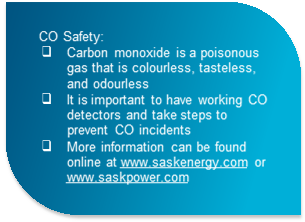SaskEnergy, SaskPower and the Saskatchewan Public Safety Agency offer reminder to stay CO safe this winter
As the winter heating season has begun, SaskEnergy is joining with the Saskatchewan Public Safety Agency (SPSA) and SaskPower to share some important tips to prevent carbon monoxide (CO) incidents.
While the effects of CO poisoning can be deadly, they can be prevented. The best defense against CO poisoning is to have all fuel-burning appliances inspected by a licensed contractor every year, and to conduct regular inspections of your chimneys and vents to ensure they are clear of debris or ice/snow buildup. Another important line of defense is the use of CO detectors to alert you to danger before the physical symptoms of CO poisoning appear.
“Working CO detectors and smoke alarms save lives,” said SPSA President Marlo Pritchard. “These alarms provide the best chance for people to escape the danger that is already present in their home.”
CO is toxic and, once inhaled, prevents red blood cells from getting the oxygen they need. CO poisoning can cause flu-like symptoms; continued exposure to high levels leads to unconsciousness, convulsions, brain damage, and can be fatal.
“CO is known as ‘the silent killer’ for a reason – you can’t see, taste or smell it,” said Syed Asif Ali, Director of Gas Inspections with SaskPower. “Incidents tend to increase during the winter months, so now is a good time to ensure your home is CO safe and that your detectors are properly installed and functioning.”
In support of carbon monoxide safety awareness, SaskEnergy is offering a $10 rebate on CO alarms at participating home stores throughout the province from November 2, 2020 to January 31, 2021. Visit www.saskenergy.com for a list of participating retail locations.
What to do if your CO detector alarm goes off? Remain calm. Take the following steps to determine the reason for the alarm:
If someone is experiencing symptoms of CO poisoning
Everyone should leave the house immediately and seek medical treatment if required. Call 911 (or your local fire department if you live in an area without 911 coverage) as soon as you are in a safe location outside of your home.
Do not re-enter your home until the CO level has been checked and it is deemed safe to do so.
Do not re-occupy your home until the sources of the CO have been found and eliminated.
If no one is experiencing symptoms
Shut off any gas appliances and open the doors and windows to ventilate your home.
If your alarm stops while your home ventilates, you may have low levels of CO in your home. Call a qualified gas contractor to check your gas appliances as soon as possible.
Here are some tips to keep your home CO safe:
- CO detectors typically expire after seven to 10 years. You need to look on the back of the detector for a manufacture or expiration date to determine if the detector needs to be replaced.
- Ensure gas equipment, chimneys and gas appliances (including gas ranges) are properly installed, maintained and inspected annually by a licensed gas contractor.
- Never leave your vehicle idling in the garage, even if the door is open. Start lawn mowers and snowblowers outside.
- Keep flue vents and chimneys clear of debris and other blockages, including frost and snow.
- Don’t operate an unvented appliance (e.g. barbecue or portable propane heater) in an enclosed space, such as a garage, ice shack, tent, shop, shed, automobile, RV or trailer, or near any combustible materials.
- Never operate a generator in a house, garage or any enclosed building.
Keep an eye out for signs of CO buildup in your home and visit www.saskenergy.com/safety/CarbonMonoxide.asp or https://www.saskpower.com/Safety/Gas-Safety/Dangers-of-Carbon-Monoxide for important safety information.




